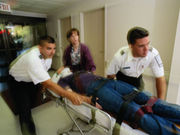Acknowledging it is a key to coping, researchers say
FRIDAY, Jan. 15, 2016 (HealthDay News) — The challenges facing trauma care providers can put them at risk for compassion fatigue and burnout, according to a study published in the January/February issue of the Journal of Trauma Nursing.
For this study, 12 trauma team members at a Level 1 trauma center were enrolled in a discussion group. The workers cited on-the-job stress triggers that included child or elder abuse, trauma involving children, cases involving multiple family members, injuries from avoidable situations, and “senseless” deaths. Other causes of stress included dealing with patients’ family members and difficulties with trauma team coordination.
Even though all participants reported low or mild stress levels, three-quarters had moderate to high scores for secondary trauma stress. One-third had a combination of high burnout and low levels of positive experiences helping patients, while another one-quarter had moderate levels of burnout.
Even though the participants said compassion fatigue was rare, assessments conducted by the researchers indicated the presence of compassion fatigue and burnout. “This suggests trauma team members may not be as adept at managing work stressors as well as they perceive,” the researchers write. In order to cope, trauma team members must acknowledge that compassion fatigue occurs and is an expected reality of the profession.
Full Text (subscription or payment may be required)
Copyright © 2016 HealthDay. All rights reserved.








